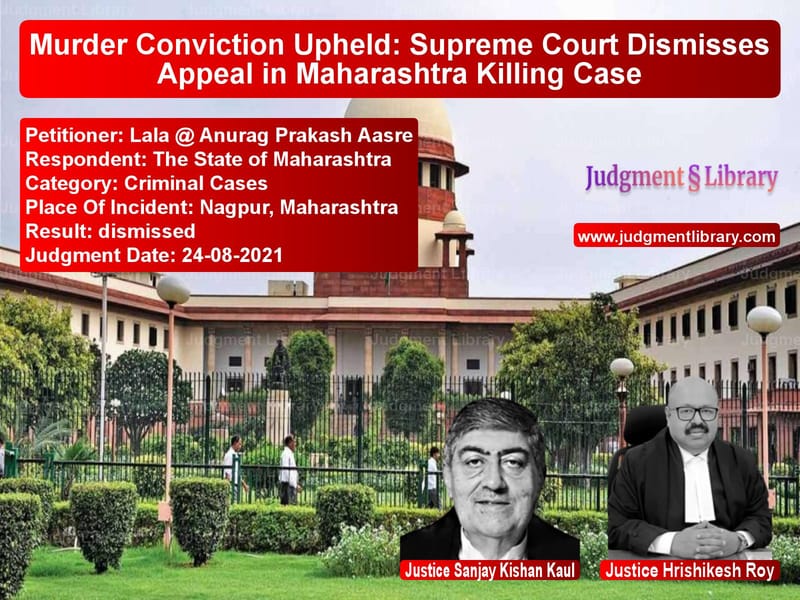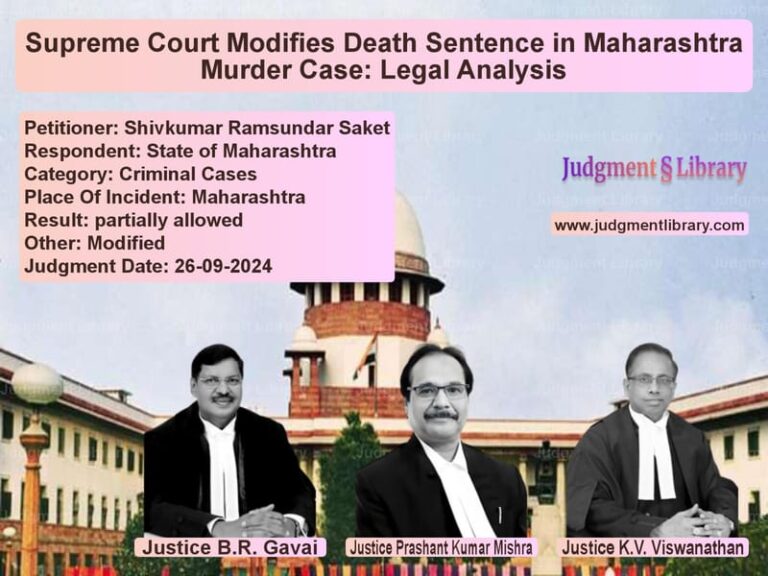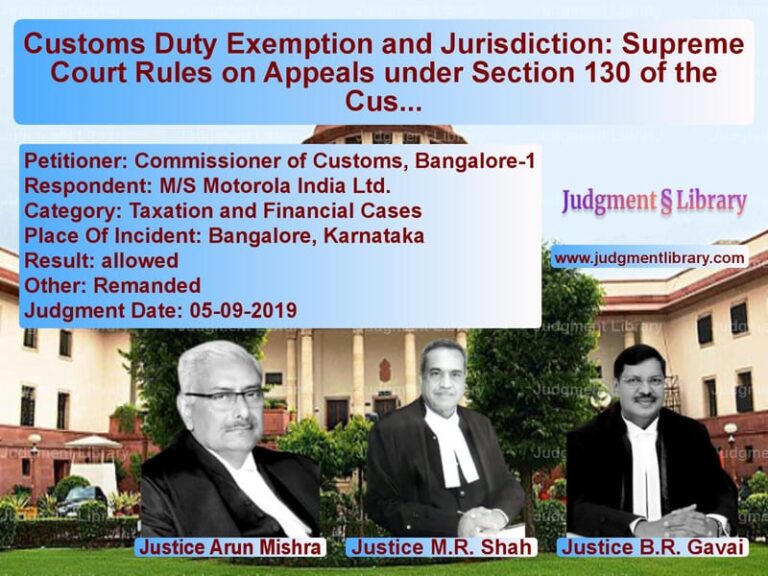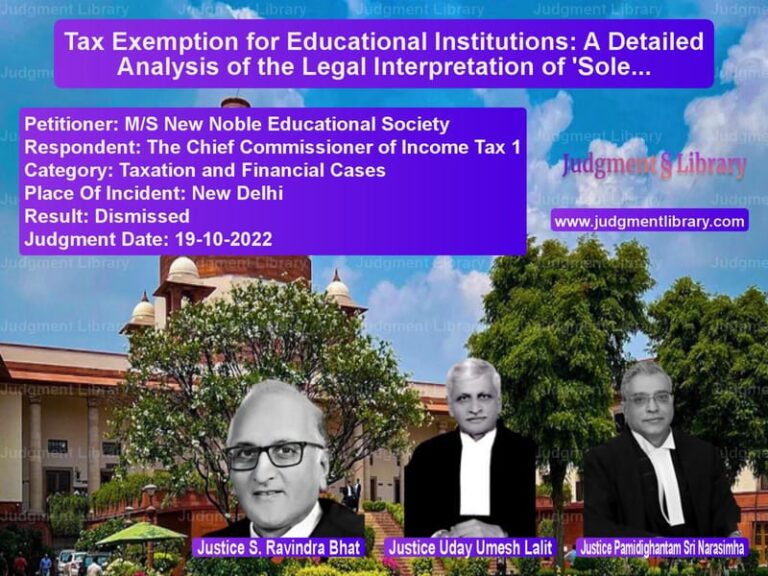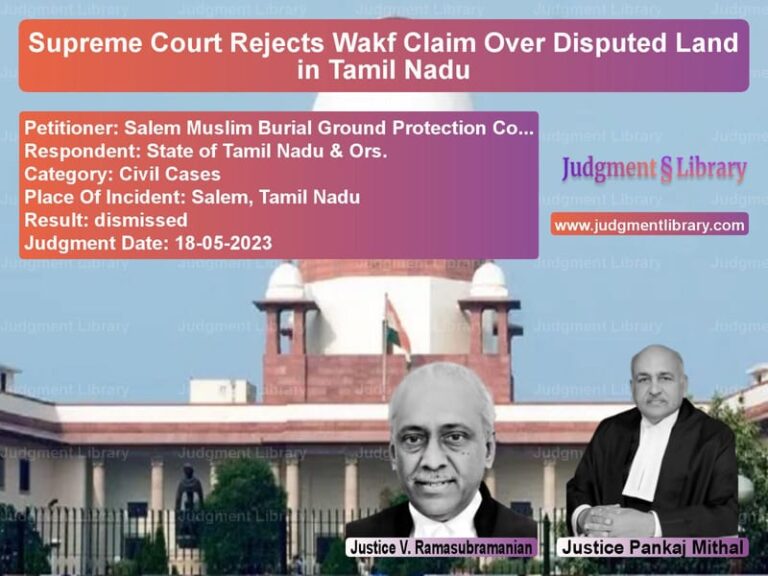Murder Conviction Upheld: Supreme Court Dismisses Appeal in Maharashtra Killing Case
The case of Lala @ Anurag Prakash Aasre vs. The State of Maharashtra was a significant criminal appeal concerning a brutal murder that took place in Nagpur. The Supreme Court had to determine whether the conviction and life imprisonment of the appellant under Sections 302, 120B, 147, 148, and 324 of the IPC were justified based on the available evidence.
Case Background
The incident occurred on 22nd January 2009, when Balu Mandpe was chatting with his friends outside his home at approximately 9:45 PM. A group of 10-12 individuals arrived on two-wheelers, hurled abuses at Balu, and attacked him with sharp weapons, including swords, knives, khanjar, and farsa. The assault resulted in grievous injuries to Balu, who was rushed to the hospital but was declared dead on arrival.
Another individual, Arun Pohankar, was also injured in the attack and later reported the incident to the Imamwada Police Station. Based on his complaint, an FIR was registered under Sections 147, 148, 149, 302, and 120B of the IPC. Nine accused, including the appellant, were put on trial before the Sessions Court in Nagpur.
Trial Court Proceedings
During the trial, the prosecution presented 11 witnesses, but none of the accused testified in their defense. The trial court concluded that the accused had formed an unlawful assembly with the common intent of murdering Balu Mandpe. The appellant, identified as Accused No. 6, was specifically accused of attacking the informant, Arun Pohankar, with a sword.
The Sessions Court convicted the accused under Section 302 IPC and sentenced them to life imprisonment with a fine of Rs. 5000 each. Additionally, the appellant was convicted under Section 324 IPC for causing injuries to the informant and sentenced to three years of rigorous imprisonment.
Arguments by the Appellant
- The appellant contended that his name was not mentioned in the FIR, which only described one of the attackers by physical appearance.
- “The prosecution failed to conduct a Test Identification Parade (TIP) to establish the identity of the appellant,” argued the defense counsel.
- There were discrepancies in witness testimonies, which raised doubts about the prosecution’s case.
- “The courts below failed to appreciate that the case was based on circumstantial evidence without conclusive proof of the appellant’s involvement,” the appellant claimed.
Arguments by the Respondent (State of Maharashtra)
- The prosecution argued that the appellant was named in a supplementary statement recorded immediately after the incident.
- “Multiple eyewitnesses, including PW2, PW4, and PW6, identified the appellant as one of the attackers and specifically mentioned his role in the crime,” the state contended.
- The injuries sustained by Arun Pohankar (PW1) were consistent with his testimony that he was attacked by a sword.
- The prosecution emphasized that even though the appellant’s name was not in the FIR, his identity was later confirmed through consistent witness testimonies.
Supreme Court’s Observations
The Supreme Court examined three key issues:
1. Does the absence of the appellant’s name in the FIR invalidate the prosecution’s case?
- The Court ruled that the FIR is not an encyclopedia and does not need to contain every detail of the crime.
- “The omission of the appellant’s name in the FIR is not fatal to the prosecution’s case when subsequent statements and evidence clearly establish his role,” the judgment stated.
2. Was the failure to conduct a Test Identification Parade (TIP) fatal to the case?
- The Court held that TIP is not mandatory when witnesses already know the accused.
- “The appellant was identified by multiple eyewitnesses in court, making a TIP unnecessary,” the judgment clarified.
3. Were the witness testimonies reliable?
- The Court noted that multiple witnesses consistently described the appellant’s role in the attack.
- “Minor discrepancies in witness statements do not discredit the prosecution’s case, especially when the core facts remain unchanged,” the Supreme Court ruled.
Supreme Court’s Judgment
The Supreme Court ruled:
- “The appeal is dismissed, and the conviction and life sentence imposed by the High Court are upheld.”
- “The State may consider the appellant’s case for remission at an appropriate stage, on its own merits.”
Conclusion
The Supreme Court’s ruling reaffirms the principles of criminal law regarding FIRs, eyewitness testimony, and identification procedures. The judgment underscores that minor procedural lapses do not invalidate a case when strong evidence is present. This decision upholds the conviction while leaving the door open for possible remission under state policies.
Petitioner Name: Lala @ Anurag Prakash Aasre.Respondent Name: The State of Maharashtra.Judgment By: Justice Sanjay Kishan Kaul, Justice Hrishikesh Roy.Place Of Incident: Nagpur, Maharashtra.Judgment Date: 24-08-2021.
Don’t miss out on the full details! Download the complete judgment in PDF format below and gain valuable insights instantly!
Download Judgment: lala-@-anurag-prakas-vs-the-state-of-maharas-supreme-court-of-india-judgment-dated-24-08-2021.pdf
Directly Download Judgment: Directly download this Judgment
See all petitions in Murder Cases
See all petitions in Attempt to Murder Cases
See all petitions in Extortion and Blackmail
See all petitions in Judgment by Sanjay Kishan Kaul
See all petitions in Judgment by Hrishikesh Roy
See all petitions in dismissed
See all petitions in supreme court of India judgments August 2021
See all petitions in 2021 judgments
See all posts in Criminal Cases Category
See all allowed petitions in Criminal Cases Category
See all Dismissed petitions in Criminal Cases Category
See all partially allowed petitions in Criminal Cases Category

